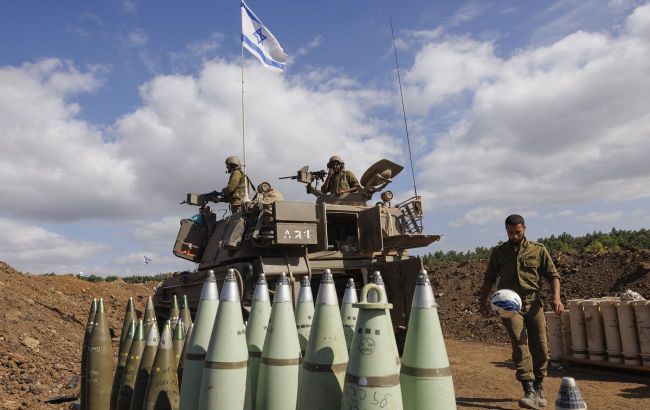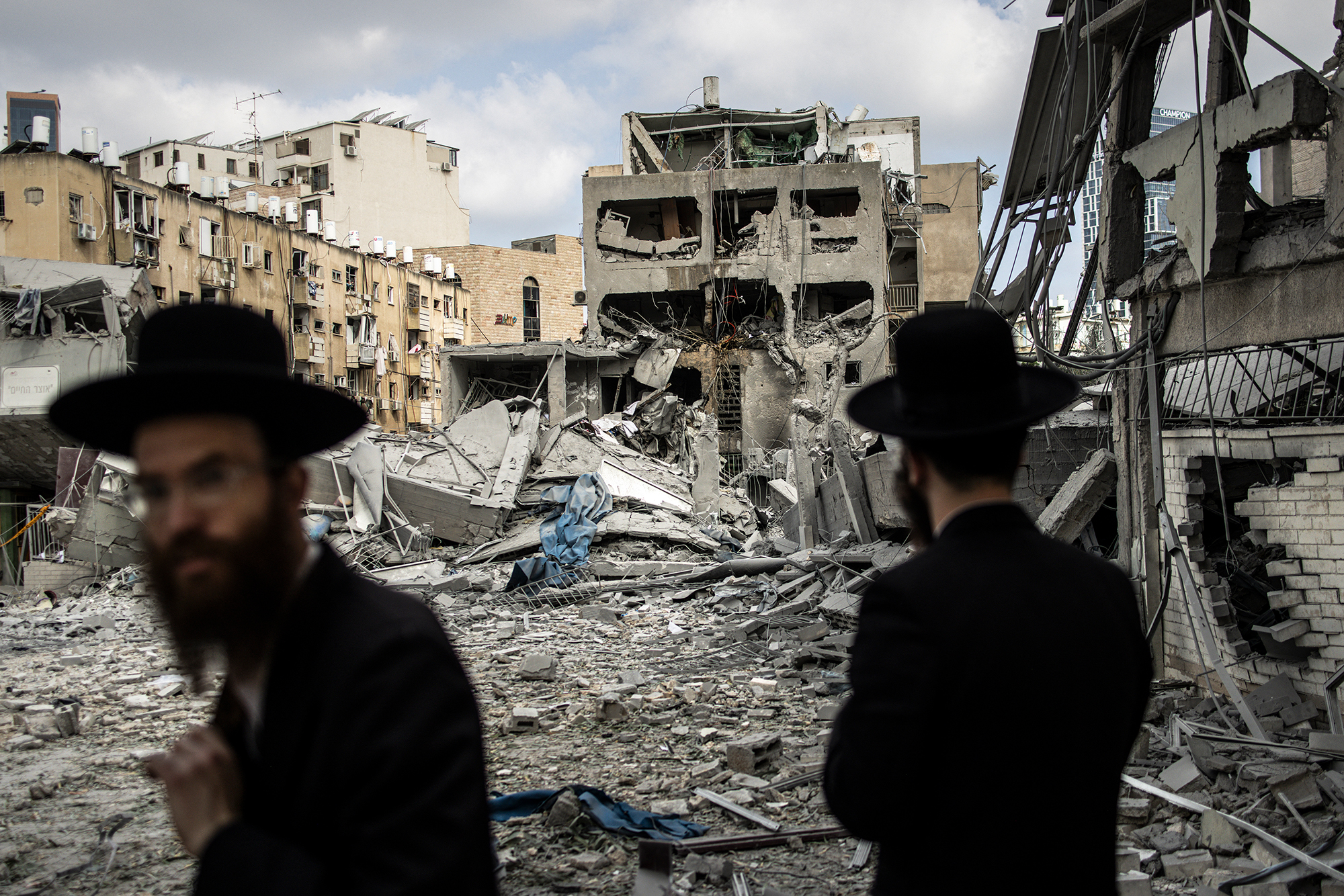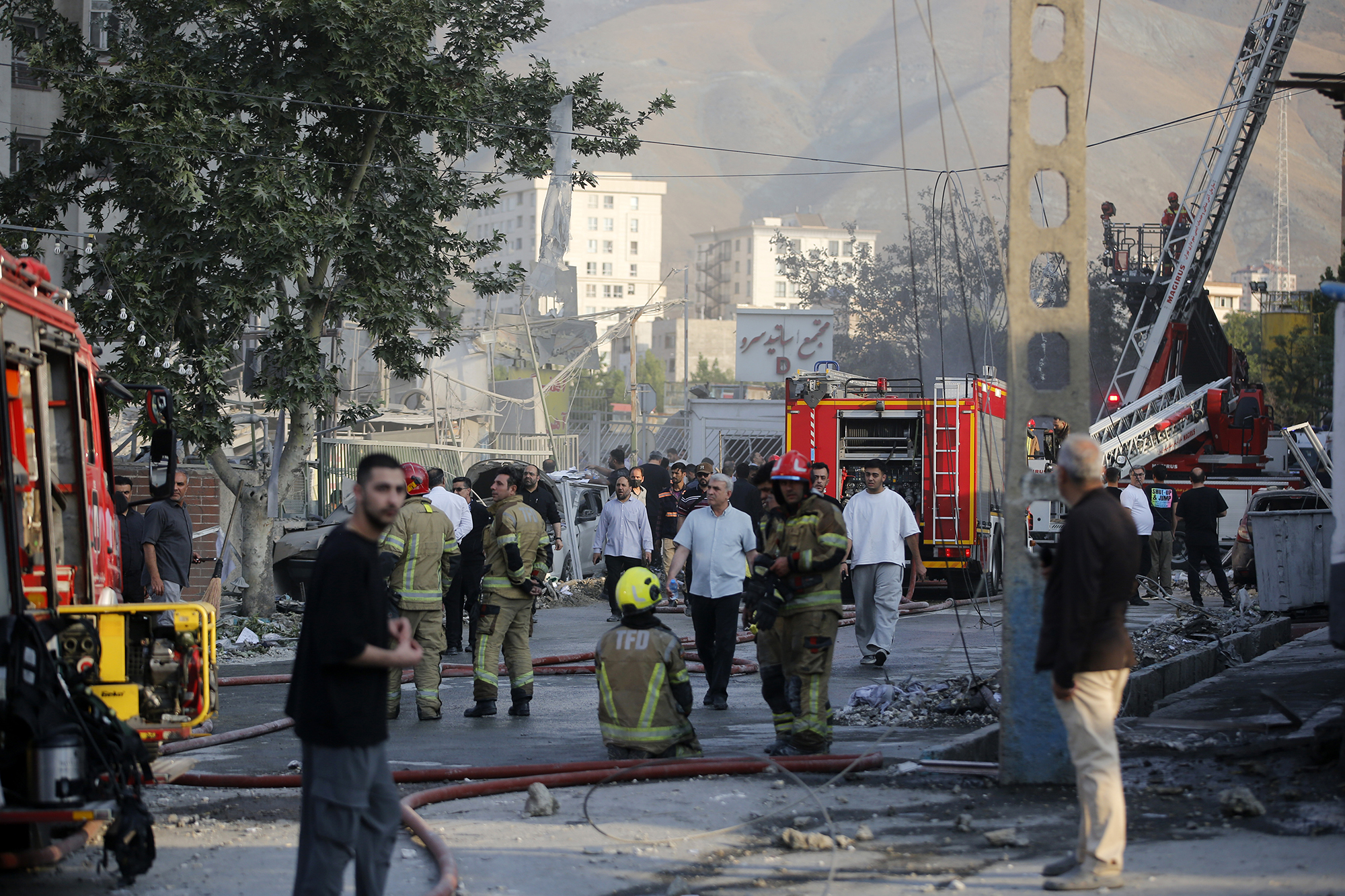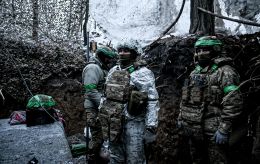Israel and Iran: Who’s ahead in the war and how Trump factors in
 Israeli military personnel (photo: Getty Images)
Israeli military personnel (photo: Getty Images)
Israel continues its attacks to stop Iran’s nuclear program, while Tehran responds by striking Tel Aviv. Read about the results Israel has achieved so far and why the US position is crucial for the future course of the war in a report by RBC-Ukraine.
Key questions
-
Has Israel been able to stop Iran’s nuclear program?
-
Will the US intervene in the war on Israel’s side?
-
Could the conflict turn into a prolonged war?
As Israel’s leadership stated at the very beginning of the escalation, "this is not a one-day war." Indeed, daily Israeli attacks on Iranian targets and rocket strikes in response continue, although their intensity has somewhat decreased. How the conflict will develop next traditionally depends on the world’s main player, the United States — essentially, personally, on Donald Trump.
As always, he comments on current events in a highly contradictory and unclear manner, although his rhetoric is gradually becoming somewhat more belligerent.
Strikes on Iran’s nuclear program and their limits
Over several days of airstrikes, Israel has destroyed nearly the entire Iranian military leadership, a significant part of its air defense and missile programs, as well as parts of its economic infrastructure. However, the nuclear facilities that could potentially enable Iran to develop nuclear weapons have not been completely neutralized.
The main uranium enrichment center in Iran — the nuclear facility at Natanz — was only partially damaged. The ground-level section of the pilot plant, where uranium enrichment up to 60% was conducted, was completely destroyed according to the IAEA. Additionally, the main power building, emergency, and backup generators were also destroyed. This may have damaged centrifuges in the underground section of the complex due to power outages, although there is no confirmation of direct physical attacks on the underground hall.
The nuclear complex in Isfahan, which includes several facilities such as the uranium conversion plant and the fuel plate production plant, was also damaged. According to the IAEA, Israeli strikes damaged four "critical buildings" in Isfahan, including both plants.
However, the underground nuclear facility at Fordow remains intact. It is located tens of meters beneath a mountain, making it invulnerable to conventional attacks. The complex houses advanced centrifuges for enriching uranium to a high level of purity.
Moreover, even before the Israeli strikes, Iran had 409 kilograms of highly enriched uranium at its disposal. This amount of material can be quickly further enriched to produce approximately 10 nuclear bombs. The current location of this uranium is unknown, said Valeriia Herhieva, a research fellow at the Institute for Peace Research and Security Policy at the University of Hamburg, to RBC-Ukraine.
"Iran can continue enriching uranium at Fordow. Also, this uranium is already enriched to 60%, if they have access to it somewhere, Iran can take it, further enrich it to 90%, and assemble a bomb. So, to say that Israel has currently damaged Iran’s nuclear program so much that it can no longer make a bomb — that’s not accurate," Gergieva noted.
According to her estimates, Iran’s nuclear program has been delayed by six months to a year but not completely destroyed. Moreover, Israel alone cannot eliminate it.
Different positions in the US regarding the conflict
The already mentioned underground nuclear facility at Fordow is one of the most challenging targets for Israel. There is no verified data about its defenses, but most estimates agree that the site is covered by 60–80 meters of rock. According to The New York Times, the only bomb capable of hitting Fordow — the GBU-57 (Massive Ordnance Penetrator, MOP) — is only in the US arsenal. It can be delivered solely by American B-2 bombers. Therefore, the destruction of Iran’s nuclear program depends largely on the United States.
At the same time, Washington has so far shown no desire to get involved in the conflict on Israel’s side. On June 13, the first day of the escalation, US Secretary of State Marco Rubio stated that his country is not participating in strikes against Iran, and the United States’ main priority is the protection of American forces in the region.

Ultra-Orthodox Jews at the site of the Iranian strike in eastern Tel Aviv (photo: Getty Images)
US President Donald Trump has issued several threatening statements toward Iran, though, as usual, they remain extremely vague. On June 15, he called on Israel and Iran to reach a peace agreement. Earlier, in an interview with ABC News, Trump said the US might intervene to help resolve the conflict. Just a day later, the president wrote that "Iran should have signed the deal" that he "told them to sign."
At times, it even seems as though the US president is not fully aware of Israel’s plans. On June 17, Trump said he expected that within the next 48 hours, it would become clearer whether Israel intends to slow down or accelerate its strikes on Iran. "You're going to find out over the next two days. You're going to find out. Nobody's slowed up so far," he said aboard Air Force One.
According to former Israeli ambassador to Russia, Arkady Mil-Man, who spoke to RBC-Ukraine’s YouTube channel, such unclear messaging reflects a lack of unity within the White House on how to approach the situation. Part of Trump’s inner circle holds isolationist views and does not want the US dragged into a new conflict. Another group — traditional Republicans — takes a more hawkish stance, but their influence on Trump is waning. A smaller third group favors a more cautious and balanced approach.
"So far, there are no clear signs that Trump has aligned himself with any of these positions or made a final decision," Mil-Man noted. "This is a serious concern for the Israeli leadership, which had hoped the US would join in. If that doesn’t happen now, Israel will face a major challenge — it will need to inflict so much damage that even if the Fordow facility remains, it alone won’t be enough for Iran to produce a nuclear bomb."
For its part, Iran is also avoiding direct confrontation with the US and has refrained from attacking American military bases in the Middle East, even though such threats had been made earlier.
Another signal that the US is not currently planning to enter the conflict against Iran is the location of its B-2 bombers — the only aircraft capable of delivering bombs powerful enough to penetrate Iran’s underground nuclear facilities. These bombers are currently based in the US at Whiteman Air Force Base. The last reported deployment involved six B-2s sent to Diego Garcia in the Indian Ocean at the end of March. At that time, Iran placed its military forces on high alert.
According to The Jerusalem Post, Trump is preparing a new set of terms for Iran, which US and European officials are calling a "last-chance offer." The report says the proposal could be more favorable than the one previously presented before Israel’s strikes, but it will still be based on the principle of zero uranium enrichment — even for civilian purposes.
Prolonging the conflict
According to Valeriia Herhieva, Iran is now trying to salvage whatever it can from Israeli attacks while also "saving face" by launching retaliatory strikes. However, while in the past Tehran only threatened to develop nuclear weapons, those threats are now likely to begin materializing. One indication of this is Iran's initiation of the procedure to withdraw from the Treaty on the Non-Proliferation of Nuclear Weapons (NPT).
"If there's another ceasefire followed by a diplomatic track, Iran may agree to it — but its long-term goal will still be to develop nuclear weapons as a deterrent against Israel," Herhieva said.
Under these circumstances, the best-case scenario for Israel would be to get the US involved in strikes against Iran. But if that doesn’t happen — which currently appears most likely — Israel faces a long and direct war with Iran.
The military aspect of the conflict is evolving daily, as Israel and Iran continue to strike one another. However, other dimensions are just as important — economic resilience, information influence, and ultimately, societal cohesion.
In both Israel and Iran, these factors play out differently. The mutual attacks are, of course, damaging to both economies, though the losses for Iran are significantly greater so far. Still, key infrastructure for Iran’s oil exports — the main source of its income — has largely remained untouched. Israel, however, could change that at any moment.
For Israel, maintaining stable economic ties with European countries is critical, far more so than with the US, as the bulk of Israeli exports are tied to Europe.
And this directly depends on how Europe perceives Israel’s actions against Iran.
The events of May this year showed how this can play out: EU foreign ministers, led by the Netherlands, backed a review of the EU-Israel Association Agreement over violations of Article 2, which requires respect for human rights. Seventeen of the 27 EU member states supported the move. Although such decisions require unanimity at the EU level, individual countries can still take measures that harm Israel economically.

Aftermath of Israeli strike, central Tehran (photo: Getty Images)
At this point, Europe has been relatively restrained in its criticism of Israel’s actions. Chancellor Friedrich Merz expressed support for Jerusalem’s right to self-defense, stating that "Israel is doing the dirty work for all of us in Iran." French President Emmanuel Macron assured that if "Israel is attacked by Iran, France will participate in its defense," while ruling out any "offensive" operations. Meanwhile, Italian Foreign Minister Antonio Tajani, following consultations with his Israeli and Iranian counterparts, called on both sides to return to negotiations, stressing that further escalation could be "extremely dangerous" for the region.
At the same time, European countries were among the most vocal critics of Israel’s actions in Gaza against Hamas. The European Union and the US also saw mass anti-Israel protests organized by left-leaning youth and Arab diaspora communities.
So far, similar demonstrations haven’t emerged in the context of the Iran conflict. This is partly due to Iran’s poor global image, but also because Israel has been careful not to strike civilian targets or oil export infrastructure. If that changes and attacks begin to affect the daily lives of ordinary Iranians, Israel risks losing the information war, as it did in Gaza.
Another important front is public opinion. In Israel, government actions currently enjoy near-unanimous support. A survey conducted by the Hebrew University for the Jerusalem Post on June 17 found that 83% of Israeli Jews support military strikes on Iran, while 46% support attacks on Iran’s nuclear facilities even without US backing.
The situation in Iran is different. While no fresh polls on the Israeli strikes have been conducted, social research consistently shows that 30–40% of Iranians are dissatisfied with the current regime. That sentiment helped liberal (by Iranian standards) candidate Masoud Pezeshkian win the most recent presidential election.
Following the beginning of the attacks, Israeli Prime Minister Benjamin Netanyahu made a direct appeal to this segment of Iranian society, calling on them to rise up against the regime. However, the opposite may happen — Iranian citizens might rally around their leaders in the face of an external threat.
In any case, the Israel-Iran conflict appears to be just beginning. In the worst-case scenario, it could lead to prolonged destabilization across the Middle East. Moreover, Israel may soon face a less obvious challenge: it could run out of targets to bomb, with all viable objectives either eliminated or damaged as much as possible. At the same time, a prolonged war is clearly an unfavorable outcome for Israel — its endurance, as a relatively small country, is not unlimited.

